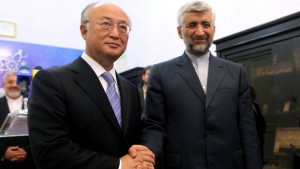Deal Reached To Allow Inspectors Access To Suspected Iranian Nuclear Weapons Sites
 In an announcement that could signal a breakthrough in resolving suspicions over Iran’s nuclear program, International Atomic Energy Agency (IAEA) Chief Yukiya Amano announced today that a deal has been reached allowing IAEA inspectors to restart a long-stalled probe into Iran’s nuclear facilities.
In an announcement that could signal a breakthrough in resolving suspicions over Iran’s nuclear program, International Atomic Energy Agency (IAEA) Chief Yukiya Amano announced today that a deal has been reached allowing IAEA inspectors to restart a long-stalled probe into Iran’s nuclear facilities.Amano, whose announcement comes a day before Iran and the P5+1 begin talks in Baghdad over Iran’s disputed uranium enrichment, is understood to have secured IAEA inspectors access to the Parchin military complex, where the agency believes Iran tested a nuclear weapon triggering device nine years. Iran has dismissed those claims and denied inspectors access, telling the IAEA that the military complex was sufficiently inspected by the agency in 2005.
Amano acknowledged that “some differences” remain with Iranian chief nuclear negotiator Saeed Jalili but that the “decision was made to conclude and sign the agreement.”
The agreement is likely to influence the upcoming negotiations in Baghdad at which Iran is expected to seek an easing of economic sanctions — including an embargo on oil deals starting July 1 and new banking restrictions.
Indeed, the new agreement, which is expected to allow inspectors access to previously closed off sites, may pressure the U.S. and other U.N. Security Council countries to offer some form of concessions in exchange for the new access to suspected nuclear sites.
The U.N. has called for a full suspension of Iranian uranium enrichment during the negotiation process but there is growing speculation that the P5+1 may accept low-uranium enrichment — under 20 percent — if inspectors are allowed access to all suspected sites.
The possibility of a brokered agreement in which IAEA inspectors gain access to all facilities and Western powers either postpone or cancel upcoming sanctions in exchange for Iran reducing its nuclear enrichment to under 20-percent could offer a face-saving outcome for both the Iranian government — which could claim victory for its domestic audience — and the U.S. and its allies.
However, Robert Wood, the U.S. envoy to the IAEA, expressed skepticism in a statement, saying Washington remained “concerned by the urgent obligation for Iran to take concrete steps to cooperate fully with the verification efforts of the IAEA, based on IAEA verification practices.”
While the U.S. and other Security Council member countries may be more open to a negotiated agreement, President Obama has committed to “preventing Iran from obtaining a nuclear weapon” and emphasized that it is “unacceptable for Iran to have a nuclear weapon.” IAEA inspectors have raised questions about possible dual-military-civilian use nuclear technologies but they have not concluded that Iran has decided to restart its nuclear weapons program after its suspension in 2003.
You can return to the main Market News page, or press the Back button on your browser.

